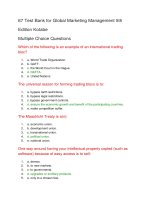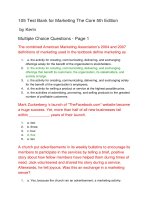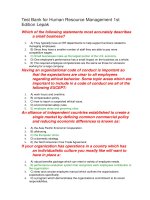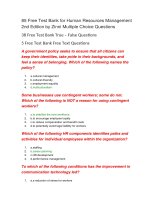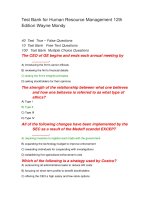Test bank for successful project management 5th edition gid1
Bạn đang xem bản rút gọn của tài liệu. Xem và tải ngay bản đầy đủ của tài liệu tại đây (76.64 KB, 13 trang )
Test Bank for Successful Project Management 5th
Edition Gido
Multiple Choice Questions
An assumption for a construction project could be
1.
2.
3.
4.
a.the materials to be used to construct the building.
b.a grant will be secured to help fund the project.
c.the regulations and codes required for the building.
d.the size of the building that is to be constructed.
The final decision of which projects to select is the
responsibility of
1.
2.
3.
4.
a.the project evaluation team's members.
b.the project evaluation team.
c.community members.
d.the organization's owner, president, or department head.
The first step in project selection is to
1.
2.
3.
4.
a.develop a set of criteria against which a project will be evaluated.
b.gather data and information for each project.
c.list assumptions.
d.evaluate each project against the criteria.
A project charter summarizes
1.
2.
3.
4.
a.the project objective.
b.the detailed description of the project.
c.the key conditions and parameters of the project.
d.the funding and contracting of the project.
The building constructed will have at least R-38 insulation
rating for the ceiling and R-28 for the walls. This is an
example of the ________________ in a project charter.
1.
2.
3.
4.
a.acceptance criteria
b.project objective
c.project description
d.success criteria and expected benefits
The project objective should
1.
2.
3.
4.
a.summarize the need and justification for the project.
b.state what is expected to be accomplished.
c.state the major end products or items expected to be produced.
d.be concise and create a vision for the end result of the project.
The project title should
1.
2.
3.
4.
a.summarize the need and justification for the project.
b.state what is expected to be accomplished.
c.state the major end products or items expected to be produced.
d.be concise and create a vision for the end result of the project.
A bidders meeting may be held to
1.
2.
3.
4.
a.clarify the RFP and answer any questions from potential bidders.
b.provide additional information only to those that attend the meeting.
c.provide an unfair advantage to those at the meeting.
d.solicit feedback on the clarity of the RFP to change the project requirements.
The project acceptance criteria should
1.
2.
3.
4.
a.summarize the need and justification for the project.
b.state the quantitative criteria expected for the products to be accomplished.
c.state the major end products or items expected to be produced.
d.be concise and create a vision for the end result of the project.
The new employees are expected to receive $13 million of
Fast Start training that will be provided by a state
workforce development grant. This is an example of
the ________________ in a project charter.
1.
2.
3.
4.
a.acceptance criteria
b.key assumptions
c.project description
d.success criteria and expected benefits
The project purpose should
1.
2.
3.
4.
a.summarize the need and justification for the project.
b.state what is expected to be accomplished.
c.state the major end products or items expected to be produced.
d.be concise and create a vision for the end result of the project.
The implementation of the new procedure is expected to
reduce costs of production by 10% over the next year.
This is an example of the ________________ in a
project charter.
1.
2.
3.
4.
a.acceptance criteria
b.project objective
c.project description
d.success criteria and expected benefits
Total Points: 0 correct out of
True - False Questions
The success criteria in the project charter indicate the
expected benefits of the project including what the
expectations are for project success.
1.
2.
True
False
Every project that is identified is selected to be completed.
1.
2.
True
False
An RFP might state the payment terms the customer intends
to use.
1.
2.
True
False
Project approval requirements state when the sponsor wants
to review the progress of the project and make
decisions about moving to the next phase.
1.
2.
True
False
The acceptance criteria describe the criteria necessary for
the sponsor to approve the deliverables.
1.
2.
True
False
The purpose of preparing a request for proposal is to state,
comprehensively and in detail, what is required, from
the contractor's point of view, to address the identified
need.
1.
2.
True
False
The project objective in the project charter indicates the
deliverable, schedule, and budget for a project.
1.
2.
True
False
All projects require a project charter to start the project.
1.
2.
True
False
The project description in the project charter is a high-level
description of the project and references more detailed
documents regarding key performance requirements.
1.
2.
True
False
An RFP must indicate the funds the customer has available
to spend on the project.
1.
2.
True
False
The RFP must include the customer requirements and the
name of the sponsor's designee
1.
2.
True
False
The project purpose in the project charter may include prior
documents for selecting the project.
1.
2.
True
False
A project should have weekly project status review meetings
supplemented with written project reports.
1.
2.
True
False
A request for proposal is required for projects that are
completed by an external contractor to an
organization.
1.
2.
True
False
If the project manager is selected in the initiating phase of
the project, then the project manager is likely to
participate in the development of the project charter
for the project.
1.
2.
True
False
A milestone schedule lists target dates for phases of a
project.
1.
True
2.
False
The sponsor designee is the project manager of the project.
1.
2.
True
False
A contract might be for a fixed price; the customer will pay
the contractor whatever the actual costs are for the
materials and the time.
1.
2.
True
False
The project charter should include as many risks as can be
brainstormed to be sure to have enough funds for
contingencies.
1.
2.
True
False
The RFP should state the required schedule for completion
of the project and key milestones.
1.
2.
True
False
The reaction of an advocacy group is categorized as a
negative consequence for a project.
1.
2.
True
False
The RFP should list any customer-supplied items.
1.
2.
True
False
The project justification includes the key assumptions for
the project.
1.
2.
True
False
The RFP might state the approvals required by the
contractor.
1.
2.
True
False
The acceptance criteria deals with the scope of the project,
outlining the tasks or work elements the customer
wants the contractor or project team to perform.
1.
2.
True
False
It is fair to meet with potential contractors and provide
information about the potential project while
developing the RFP.
1.
2.
True
False
The initiating phase of the project life cycle starts with
recognizing a need.
1.
2.
True
False
A contract might be for time and materials, in which case the
customer will pay the contractor a fixed amount
regardless of how much the work actually costs the
contractor.
1.
2.
True
False
Disadvantages for doing a project may have a positive
impact on an organization.
1.
2.
True
False
A request for proposals helps the organization decide which
contractor to use.
1.
2.
True
False
Quantitative benefits of a project are the intangible benefits
of completing a project such as employee morale.
1.
2.
True
False
An RFP must provide a statement of work.
1.
2.
True
False
The RFP should provide instructions for the format and
content of the contractor proposals.
1.
2.
True
False
Meeting the acceptance criteria listed in the project charter
means the customer is satisfied.
1.
2.
True
False
Some RFPs mention the type of contract the customer
intends to use.
1.
2.
True
False
Unexpected events are reasons for an organization to decide
to initiate a project.
1.
2.
True
False
The RFP should indicate the due date by which the customer
expects potential contractors to submit proposals.
1.
2.
True
False
Surveys of stakeholders can be used to gather only
quantitative data.
1.
2.
True
False
Funding statements in a project charter may be broken into
the amount authorized by project phase.
1.
2.
True
False
The RFP must state the project objective or purpose,
including any rational or background information that
may be helpful to contractors so that they can prepare
thorough and responsive proposals.
1.
2.
True
False
The RFP should state the acceptance criteria the customer
will use to determine if the project deliverables are
completed according to the customer’s requirements.
1.
2.
True
False
The approval date for the project is the project start date.
1.
2.
True
False
A good RFP allows contractors or a project team to
understand what the customer expects.
1.
2.
True
False
Part of preparing a request for proposal is soliciting the
request to potential bidders on the project.
1.
2.
True
False
The project charter is also called a project authorization or a
project initiation document.
1.
2.
True
False
The constraints for a project include the requirement to
outsource due to the organization's lack of having
expertise with its own staff.
1.
2.
True
False
The RFP should state what deliverables the customer
expects the contractor to provide.
1.
2.
True
False
The major deliverables in the project charter describe the
details of the work packages in the work breakdown
structure.
1.
2.
True
False
Some potential contractors will know more about an
organization due to prior contracts and relationships.
This is an unfair advantage for those contractors to
submit a proposal to an RFP.
1.
2.
True
False
The project title should be a code word even if the project is
not confidential.
1.
2.
True
False
Projects that are not similar cannot be compared when
making a selection to move forward with a project.
1.
2.
True
False
Free Text Questions
Describe the benefits and consequences of the project
evaluation team reviewing each project against the
project evaluation criteria before the committee
meeting.
Answer Given
Responses will vary. Benefits include an opportunity for each member to have
thoughtful preparation prior to the meeting and having a personal opinion prior to
the meeting. Consequences include that the positions are taken from the
perspective of the individual and the individual may not have the expertise
necessary to evaluate all the aspects of every project. Project evaluation teams
are made up of people with a variety of skills to have a broad perspective for the
evaluation. Each person on the team would have an opportunity to have evaluated
the projects from their perspective and expertise then bring that expertise to the
evaluation committee meeting.
List eight elements that could be included in a project
charter. Describe why each element is valuable to the
project charter.
Answer Given
Listed are the project elements and what each one adds to a project charter. Each
helps with the planning of the project and moving from the initiating to the planning
phase of the project: a. project title communicates a vision for the end result of the
project, unless confidentiality is necessary and a code name is used; b. purpose
summarizes the need and justification for the project; c. description provides a
high-level description of the project and may include the major tasks, major
phases, and a work breakdown structure; d. Objective states what is expected to
be accomplished; e. success criteria or expected benefits indicate the quantitative
benefits of the project; f. funding indicates the total amount of funds authorized for
the project; g. major deliverables state what is expected to be completed at the
end of the project; h. acceptance criteria describe the quantitative criteria for each
major deliverable; i. milestone schedule lists the target dates or times for the
achievement of key events for the project; j. key assumptions include those in the
base for the project justification and rationale, and include assumptions about
resources for the project; k. constraints describe requirements or limitations for the
project; l. major risks identify any risk that the sponsor thinks has a high likelihood
of occurrence or a high degree of potential impact; m. approval requirements
define the limits of authority of the project manager; n. project manager identifies
the person from the organization that is assigned as the project manager;o.
reporting requirements state the frequency and content of project status reviews
and reports; p. sponsor design state who the sponsor designates to act on behalf
of the project sponsor; q. approval signature and date indicate that the sponsor
has officially or formally authorized the project. The project charter authorizes the
project to go forward and provides the key conditions and parameters that are the
framework for the project manager and the project team to develop a detailed
baseline plan for performing the project.
List at least three ways projects are identified.
Answer Given
Responses should include: a. during an organization's strategic planning; b. in
response to unexpected events, c. or as a result of a group of individuals deciding
to organize a project to address a particular need. Projects are identified in various
ways during an organization's strategic planning; in response to unexpected
events, or as a result of a group of individuals deciding to organize a project to
address a particular need.
An RFP may include the evaluation criteria that will be used
to evaluate proposals from competing contractors. List
at least three evaluation criteria that might be included
in an RFP.
Answer Given
Criteria might include the following: a. the contractor’s experience with similar
projects; b. the technical approach proposed by the contractor; c. the schedule; d.
the costs. An RFP may include the evaluation criteria that will be used to evaluate
proposals from competing contractors. Criteria might include the following: a. the
contractor’s experience with similar projects; b. the technical approach proposed
by the contractor; c. the schedule; d. the costs
Housing Transitions, a local not-for-profit organization that
provides temporary housing for people that are in
transition (i.e., just moved into an area, lost their home
due to an unexpected event, etc.), has noticed paint on
the outside of the house is peeling. Describe a project
that will advance their mission and solve the problem
of the paint peeling.
Answer Given
Responses should include information that will advance the mission of providing
housing and painting the outside of the house. Be sure that the project described
includes a deliverable, schedule, and budget. One possible solution is to have a
painting party with members of the community that donate painting supplies and
labor to paint the house. The party would take place the first weekend in June.
The project should include those that would be in position to help people that may
need a temporary home in the area. The project should include information related
to communicating the mission of Housing Transitions by reinforcing that the
housing is a temporary place to stay until a permanent residence can be secured
and taking care of the external walls of the house by securing painting supplies
and labor necessary to satisfactorily removing the peeling paint and repainting the
house.
List methods for gathering information from a project's
stakeholders.
Answer Given
List answers should include surveys, focus groups, interviews, and analysis of
available reports. Methods for gathering information from project stakeholders
include surveys, focus groups, interviews, and analysis of available reports.
James must gather information from a potential project's
stakeholders for an upcoming meeting with
management. The project would be to add 50 beds and
an oncology center to the local hospital. List three
stakeholders of the project and a possible way that
James could gather information from the stakeholders.
Answer Given
Responses will vary. Stakeholders could be employees, consumers, funding
agency members, or community residents. Possible ways to gather the
information could be surveys, focus groups, interviews, and analysis of available
reports. Stakeholders could be employees, consumers, funding agency members,
or community residents. Possible ways to gather the information could be surveys,
focus groups, interviews, and analysis of available reports.

